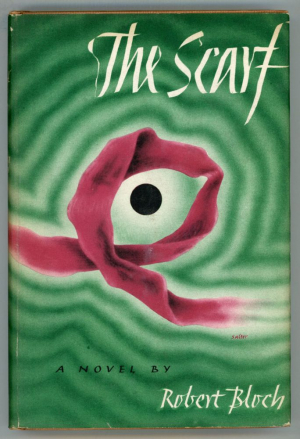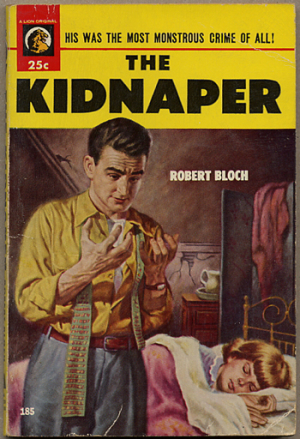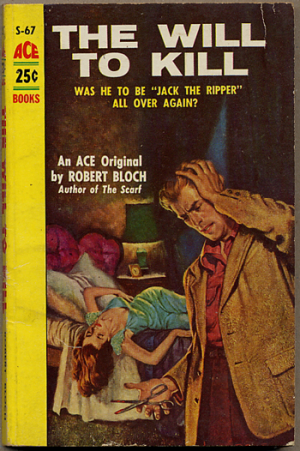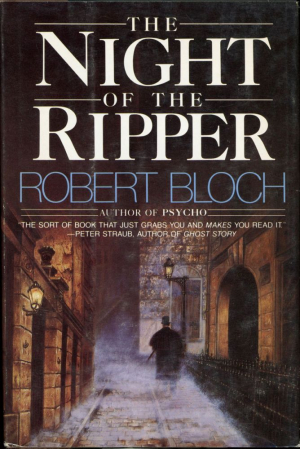Robert Bloch is best known for his seminal novel Psycho but since this is the most cited fact about him, I am mentioning it as sparingly as possible. He had a noteworthy career that involved much more that deserves mention and I intend to focus on his other crime and horror novels. 
The start of Bloch's career was something special in itself. He was an avid reader of Weird Tales magazine and was so enthusiastic about it that he became one of H.P. Lovecraft's penpals. At Lovecraft's encouragement, Bloch started writing his own fiction that HPL would critique. At 17, Bloch was out of high school and was a regular contributor to Weird Tales. Personally, I think his greatest strength as a writer shines through his short stories and will eventually devote an article to that. Bloch's short stories started to be collected in book form while he was in his twenties.
In 1947, he published his first novel The Scarf about psychopath Dan Morley, who strangles women he becomes involved with and writes about his experiences in the guise of fiction. More compelling are his musings that he writes in "The Black Notebook" which contain Morley's memories, dreams, and fantasies. Bloch commented that there was a scene in the book that the editor kept out of the original publication of the novel, ". . .the omission--by the editor--of a short chapter: a dream-sequence sort of notebook entry where Morley fantasizes himself as going up on a rooftop with a rifle and shooting down people at random. "Too wild!" insisted the editor. No comment." Bloch is alluding to the University of Texas tower shooting that occurred in 1966. This chapter was restored in Scream Press's omnibus of Bloch's novels Unholy Trinity.
 To anticipate an attack by a psychopath almost twenty years in advance demonstrates Bloch's insight into human psychology. The Scarf was ahead of its time for giving an unflinching first person glimpse into Dan Morley's psychosis. It is an effective piece of horror/crime noir fiction that isn't remarked upon enough.
To anticipate an attack by a psychopath almost twenty years in advance demonstrates Bloch's insight into human psychology. The Scarf was ahead of its time for giving an unflinching first person glimpse into Dan Morley's psychosis. It is an effective piece of horror/crime noir fiction that isn't remarked upon enough.
Another standout book is The Kidnapper. A sociopath Steve Collins, plots with his lover and a friend to kidnap a rich man's daughter. The kidnapping works out, but the plan goes south after that. To me, this one reads the most like James M Cain's noir works (such as The Postman Always Rings Twice). Like most noir novels, Steve sows the seeds of his own failure. The end of the novel, when he surrenders, is full of bitter irony. He cynically refers to himself as the monster when it is obvious that he looks as normal as everyone else. This sense of chilling duality is prominent in Bloch's work. We see it in The Dead Beat, his Psycho novels, and American Gothic. In all of these books, we are privy to Bloch's unique insight into the killer's motives. We can see the seemingly upstanding and normal exterior of the killer but Bloch fully unfolds the truth just beneath the surface which is alien to what is considered healthy and acceptable. Evil doesn't have a distinct face; it is camouflaged in the mundane, sometimes concealed in another personality completely.
Let's not forget that there are similar themes to be found in The Will to Kill, Firebug, and Terror. Most of Bloch's books are out of print and it's our loss. With the abundance of reprint publishers out there, these books are overdue for rediscovering.
Lastly, I'd like to mention Bloch's novel The Night of the Ripper. It's not so much a novel about a killer's motives as it is a study of violence and mankind's fascination with it. Bloch wrote a heading for each chapter in the novel, "This series of headings deals with episodes taken from history--either excerpts of actual accounts or paraphrases--extending from 2300 BC to 1888 AD the year of the Ripper's murders. These headings from countries all over the world, are accounts of cruelties and atrocities perpetrated in the name of patriotism, religion, and sheer perversity. As such, they are intended to serve as a subtle reminder that the deeds of a "monster" like Jack the Ripper pale to insignificance alongside the accepted customs of "ordinary" citizens in all walks of life, at all times and all places. . .[The series of headings] helps to elevate the book somewhat above the mere thriller level--or do I hope."
These thoughts make me wonder what our interest in violence is and that can be analyzed to infinity. Why do the Ripper's crimes stand out so much? Partly, I think it is due to the fact that the Ripper was never caught and we never found out his or her reasons for committing the murders. In short, people love a mystery. Once again, Bloch makes use of irony, pointing out that people are shocked by the Ripper's killings when mankind has done so much worse in the past.
 The novels I discussed at length are my favorites of Bloch's. Not all of the ones he wrote were winners. He wasn't a perfect writer but I am convinced that there are no perfect writers because the perfect writer would please everybody and not even Shakespeare can claim that.
The novels I discussed at length are my favorites of Bloch's. Not all of the ones he wrote were winners. He wasn't a perfect writer but I am convinced that there are no perfect writers because the perfect writer would please everybody and not even Shakespeare can claim that.
Bloch's writing was hypnotic, engaging, entertaining, and relatable. With wit, class, and a moral center Bloch amassed an intimidating list of writing credits and it would take a series of articles to explain how he influenced generations of writers that came after him. He was a brilliant storyteller.
Source of quotes: The Robert Bloch Companion, edited by Randall Larson
Written by Nicholas Montelongo

The start of Bloch's career was something special in itself. He was an avid reader of Weird Tales magazine and was so enthusiastic about it that he became one of H.P. Lovecraft's penpals. At Lovecraft's encouragement, Bloch started writing his own fiction that HPL would critique. At 17, Bloch was out of high school and was a regular contributor to Weird Tales. Personally, I think his greatest strength as a writer shines through his short stories and will eventually devote an article to that. Bloch's short stories started to be collected in book form while he was in his twenties.
In 1947, he published his first novel The Scarf about psychopath Dan Morley, who strangles women he becomes involved with and writes about his experiences in the guise of fiction. More compelling are his musings that he writes in "The Black Notebook" which contain Morley's memories, dreams, and fantasies. Bloch commented that there was a scene in the book that the editor kept out of the original publication of the novel, ". . .the omission--by the editor--of a short chapter: a dream-sequence sort of notebook entry where Morley fantasizes himself as going up on a rooftop with a rifle and shooting down people at random. "Too wild!" insisted the editor. No comment." Bloch is alluding to the University of Texas tower shooting that occurred in 1966. This chapter was restored in Scream Press's omnibus of Bloch's novels Unholy Trinity.
 To anticipate an attack by a psychopath almost twenty years in advance demonstrates Bloch's insight into human psychology. The Scarf was ahead of its time for giving an unflinching first person glimpse into Dan Morley's psychosis. It is an effective piece of horror/crime noir fiction that isn't remarked upon enough.
To anticipate an attack by a psychopath almost twenty years in advance demonstrates Bloch's insight into human psychology. The Scarf was ahead of its time for giving an unflinching first person glimpse into Dan Morley's psychosis. It is an effective piece of horror/crime noir fiction that isn't remarked upon enough. Another standout book is The Kidnapper. A sociopath Steve Collins, plots with his lover and a friend to kidnap a rich man's daughter. The kidnapping works out, but the plan goes south after that. To me, this one reads the most like James M Cain's noir works (such as The Postman Always Rings Twice). Like most noir novels, Steve sows the seeds of his own failure. The end of the novel, when he surrenders, is full of bitter irony. He cynically refers to himself as the monster when it is obvious that he looks as normal as everyone else. This sense of chilling duality is prominent in Bloch's work. We see it in The Dead Beat, his Psycho novels, and American Gothic. In all of these books, we are privy to Bloch's unique insight into the killer's motives. We can see the seemingly upstanding and normal exterior of the killer but Bloch fully unfolds the truth just beneath the surface which is alien to what is considered healthy and acceptable. Evil doesn't have a distinct face; it is camouflaged in the mundane, sometimes concealed in another personality completely.

Let's not forget that there are similar themes to be found in The Will to Kill, Firebug, and Terror. Most of Bloch's books are out of print and it's our loss. With the abundance of reprint publishers out there, these books are overdue for rediscovering.
Lastly, I'd like to mention Bloch's novel The Night of the Ripper. It's not so much a novel about a killer's motives as it is a study of violence and mankind's fascination with it. Bloch wrote a heading for each chapter in the novel, "This series of headings deals with episodes taken from history--either excerpts of actual accounts or paraphrases--extending from 2300 BC to 1888 AD the year of the Ripper's murders. These headings from countries all over the world, are accounts of cruelties and atrocities perpetrated in the name of patriotism, religion, and sheer perversity. As such, they are intended to serve as a subtle reminder that the deeds of a "monster" like Jack the Ripper pale to insignificance alongside the accepted customs of "ordinary" citizens in all walks of life, at all times and all places. . .[The series of headings] helps to elevate the book somewhat above the mere thriller level--or do I hope."
These thoughts make me wonder what our interest in violence is and that can be analyzed to infinity. Why do the Ripper's crimes stand out so much? Partly, I think it is due to the fact that the Ripper was never caught and we never found out his or her reasons for committing the murders. In short, people love a mystery. Once again, Bloch makes use of irony, pointing out that people are shocked by the Ripper's killings when mankind has done so much worse in the past.
 The novels I discussed at length are my favorites of Bloch's. Not all of the ones he wrote were winners. He wasn't a perfect writer but I am convinced that there are no perfect writers because the perfect writer would please everybody and not even Shakespeare can claim that.
The novels I discussed at length are my favorites of Bloch's. Not all of the ones he wrote were winners. He wasn't a perfect writer but I am convinced that there are no perfect writers because the perfect writer would please everybody and not even Shakespeare can claim that. Bloch's writing was hypnotic, engaging, entertaining, and relatable. With wit, class, and a moral center Bloch amassed an intimidating list of writing credits and it would take a series of articles to explain how he influenced generations of writers that came after him. He was a brilliant storyteller.
Source of quotes: The Robert Bloch Companion, edited by Randall Larson
Written by Nicholas Montelongo
The author does not allow comments to this entry
No comments